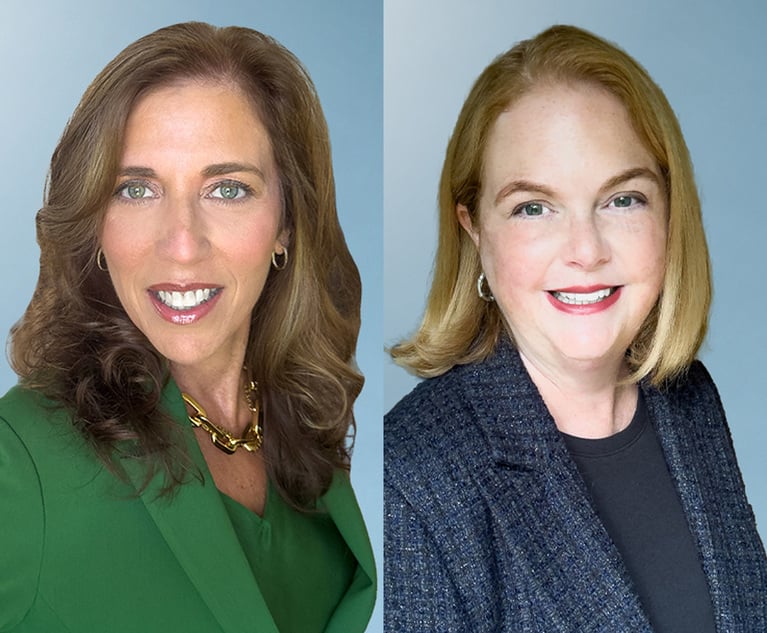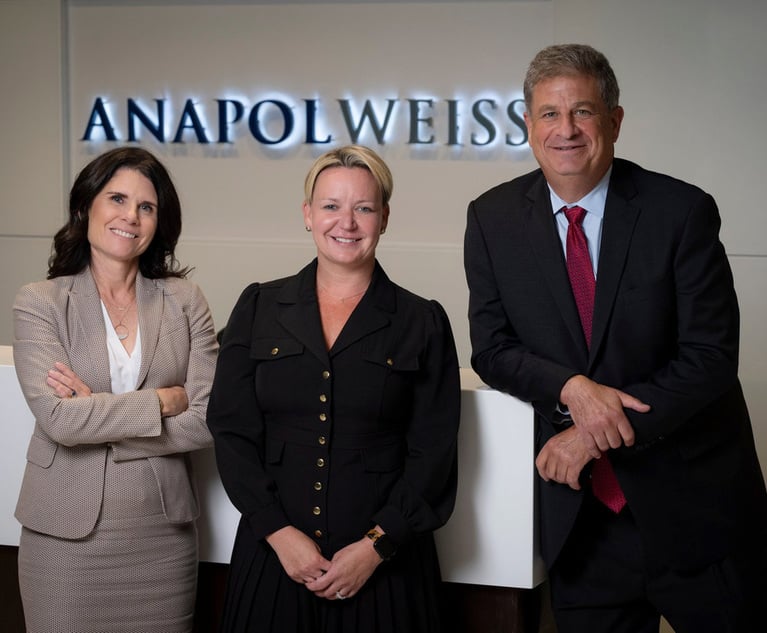Litigation Department of the Year, Overall Winner: Keker, Van Nest & Peters
The firm scored blockbuster IP defense wins for Google and Arista Networks Inc., and secured a nationwide injunction barring President Donald Trump from enforcing his threat to withhold federal funds from sanctuary cities.
November 14, 2017 at 02:00 PM
7 minute read

This past year Keker, Van Nest & Peters scored three wins that any firm would be proud to call their case of the year. In May 2016, after a two-week trial, a federal jury in San Francisco unanimously sided with client Google Inc. In a rematch of what the judge called the “World Series of IP cases,” the jury found that Google's incorporation of copyrighted elements of Oracle Corp.'s Java programming language in the Android mobile operating system was a fair use.
The firm followed that up with a second blockbuster copyright trial win in December 2016, this time for client Arista Networks Inc. There a San Jose federal jury awarded no damages to larger network switching rival Cisco Systems Inc. siding with Arista under the so-called scènes à faire doctrine that allows for copying in instances where there's essentially no other way to express an idea besides the copyrighted expression.
In April, the firm topped the year off by securing a nationwide injunction barring the Trump administration from acting on its threat to withhold federal funds from sanctuary cities.
Firm managing partner Steven Taylor took some time to reflect on the past year with The Recorder recently and what Keker might have in store for an encore.
What do these wins demonstrate about Keker's litigation capacities? We are proud of our experience and reputation as trial lawyers for the biggest, toughest cases, and we are passionate about what we do. Our clients and our opponents know that we will see a case through to the end, which is why clients entrust us with their highest risk cases, where their business and reputation rely on the result. We are also proud of how many of our attorneys participated meaningfully in these cases. We have a very deep bench of exceptional trial lawyers, and our trials and major cases were handled by almost entirely different teams. Specifically for these cases, I think Google and Arista cases showcased our IP chops, tech knowledge, and ability to craft a business story around highly technical issues. The Trump case is frankly just the right thing to do; undermining our constitution shouldn't sit well with any lawyer.
Keker prides itself on taking on some of its clients toughest matters and litigating cases against much bigger national and international firms. How have you been able to build a firm that can take on these types of cases while remaining relatively small compared to those you compete against in the market? Next year the firm will celebrate our 40th anniversary, and through our history we have grown strategically and organically. We're small by design; we never wanted to be a global firm. We grow internally through our summer, clerkship and associate hiring programs, and our associates become our partners. We historically do not hire lateral partners.
This growth model allows us to consistently develop and maintain our strategic focus throughout our attorneys and our cases. That, and our one-office, litigation-only, trial-focused approach allows us to maintain the top-down quality our clients expect. And our smaller size means that we don't take a scorched earth approach to litigate every potential option. We identify and press the few key issues and themes that are most likely to successfully meet our clients' objectives. And because we are smaller, all lawyers on our teams play meaningful roles on our cases.
Is there any one trait that you think is consistent across all the firm's litigators? If so, what is it? We are tough, smart and laser-focused on finding success for our clients, and above all collaboration is at the heart of our firm. We are not a global “Big Law” firm. We don't have rigid practice groups. We don't have silos. We need everyone together finding creative ways to win for our clients. We love our work and our firm, and our continued success takes collaborative effort from all of us.
Fewer cases are going to trial, and those that are tend to be high stakes. In light of these facts, what is the firm doing to get new lawyers stand-up opportunities in front of judges and juries? We recognize, probably more acutely than other firms, that providing the substantial opportunities in front of judges and juries necessary to develop the next generation of trial lawyers can be a challenge. Fewer cases go to trial, and fewer issues are heard by judges. We staff our case teams leanly, and each lawyer (including associates) has to play a significant role in the case. We make an effort to work with clients so that our attorneys get a chance to argue a motion, take or defend a deposition, based on their familiarity with the issues, not seniority.
Getting as many people as possible these opportunities is an important part of our success. For cases in trial, no one person can be the expert on all issues. For the judge or jury, it gives them a break from hearing from only one spokesperson. And as many of our clients recognize, it is in their best interest to have diverse representation in front of juries. Beyond jury trials, we have a number of cases before arbitrators and administrative bodies, like the ITC, which increase the chances of stand-up opportunities. It has also been encouraging to see judges issuing orders advocating for, or even requiring that, junior associates argue motions; hopefully we will see more requests like that.
In addition, many of our attorneys, including our most junior attorneys, lead important pro bono matters. We're not only proud of their commitments to causes they value, but also the really tremendous results that they've achieved. And in those cases they develop stand-up skills and strategic thinking. We also have been sending lawyers to spend three to four months with local public defenders or district attorneys, trying misdemeanor cases as first-chair trial lawyers.
How are your litigators harnessing technology to work more efficiently? With so many tech-oriented clients and cases that have technology at their core, we're always looking for ways for technology to make us more efficient, be it through implementing new ways for our attorneys to connect and communicate with each other and our clients, enabling remote access from any location, providing for video depositions with real-time transcriptions, or using e-discovery software with features like predictive narrowing for massive data searches.
After a year like this one, what do you do for an encore? We're going to do it again! We have a pretty busy docket filled with complex, interesting and important cases. To name just a handful: In early 2018 we're representing the former chief financial officer of British software company Autonomy, in a federal criminal trial related to Autonomy's $11 billion acquisition by HP. We are defending Qualcomm in high-stakes multidistrict litigation that alleges Qualcomm ignored its contractual obligations to license standard-essential patents at fair, reasonable and nondiscriminatory (FRAND) rates. And we're defending cycling legend Lance Armstrong against the U.S. Postal Service's attempt to claw back sponsorship monies. They're all complicated, high-stakes cases. That's what we love, so with luck we'll be doing this interview again next year.
This content has been archived. It is available through our partners, LexisNexis® and Bloomberg Law.
To view this content, please continue to their sites.
Not a Lexis Subscriber?
Subscribe Now
Not a Bloomberg Law Subscriber?
Subscribe Now
NOT FOR REPRINT
© 2024 ALM Global, LLC, All Rights Reserved. Request academic re-use from www.copyright.com. All other uses, submit a request to [email protected]. For more information visit Asset & Logo Licensing.
You Might Like
View All

Faegre Drinker Adds Three Former Federal Prosecutors From Greenberg Traurig
4 minute read
Anapol Weiss Acquires Boutique Led by Star Litigator Alexandra Walsh
5 minute read
Pierson Ferdinand Lures Veteran M&A Specialist From Sheppard Mullin in Silicon Valley
4 minute readTrending Stories
- 1Call for Nominations: Elite Trial Lawyers 2025
- 2Senate Judiciary Dems Release Report on Supreme Court Ethics
- 3Senate Confirms Last 2 of Biden's California Judicial Nominees
- 4Morrison & Foerster Doles Out Year-End and Special Bonuses, Raises Base Compensation for Associates
- 5Tom Girardi to Surrender to Federal Authorities on Jan. 7
Who Got The Work
Michael G. Bongiorno, Andrew Scott Dulberg and Elizabeth E. Driscoll from Wilmer Cutler Pickering Hale and Dorr have stepped in to represent Symbotic Inc., an A.I.-enabled technology platform that focuses on increasing supply chain efficiency, and other defendants in a pending shareholder derivative lawsuit. The case, filed Oct. 2 in Massachusetts District Court by the Brown Law Firm on behalf of Stephen Austen, accuses certain officers and directors of misleading investors in regard to Symbotic's potential for margin growth by failing to disclose that the company was not equipped to timely deploy its systems or manage expenses through project delays. The case, assigned to U.S. District Judge Nathaniel M. Gorton, is 1:24-cv-12522, Austen v. Cohen et al.
Who Got The Work
Edmund Polubinski and Marie Killmond of Davis Polk & Wardwell have entered appearances for data platform software development company MongoDB and other defendants in a pending shareholder derivative lawsuit. The action, filed Oct. 7 in New York Southern District Court by the Brown Law Firm, accuses the company's directors and/or officers of falsely expressing confidence in the company’s restructuring of its sales incentive plan and downplaying the severity of decreases in its upfront commitments. The case is 1:24-cv-07594, Roy v. Ittycheria et al.
Who Got The Work
Amy O. Bruchs and Kurt F. Ellison of Michael Best & Friedrich have entered appearances for Epic Systems Corp. in a pending employment discrimination lawsuit. The suit was filed Sept. 7 in Wisconsin Western District Court by Levine Eisberner LLC and Siri & Glimstad on behalf of a project manager who claims that he was wrongfully terminated after applying for a religious exemption to the defendant's COVID-19 vaccine mandate. The case, assigned to U.S. Magistrate Judge Anita Marie Boor, is 3:24-cv-00630, Secker, Nathan v. Epic Systems Corporation.
Who Got The Work
David X. Sullivan, Thomas J. Finn and Gregory A. Hall from McCarter & English have entered appearances for Sunrun Installation Services in a pending civil rights lawsuit. The complaint was filed Sept. 4 in Connecticut District Court by attorney Robert M. Berke on behalf of former employee George Edward Steins, who was arrested and charged with employing an unregistered home improvement salesperson. The complaint alleges that had Sunrun informed the Connecticut Department of Consumer Protection that the plaintiff's employment had ended in 2017 and that he no longer held Sunrun's home improvement contractor license, he would not have been hit with charges, which were dismissed in May 2024. The case, assigned to U.S. District Judge Jeffrey A. Meyer, is 3:24-cv-01423, Steins v. Sunrun, Inc. et al.
Who Got The Work
Greenberg Traurig shareholder Joshua L. Raskin has entered an appearance for boohoo.com UK Ltd. in a pending patent infringement lawsuit. The suit, filed Sept. 3 in Texas Eastern District Court by Rozier Hardt McDonough on behalf of Alto Dynamics, asserts five patents related to an online shopping platform. The case, assigned to U.S. District Judge Rodney Gilstrap, is 2:24-cv-00719, Alto Dynamics, LLC v. boohoo.com UK Limited.
Featured Firms
Law Offices of Gary Martin Hays & Associates, P.C.
(470) 294-1674
Law Offices of Mark E. Salomone
(857) 444-6468
Smith & Hassler
(713) 739-1250






